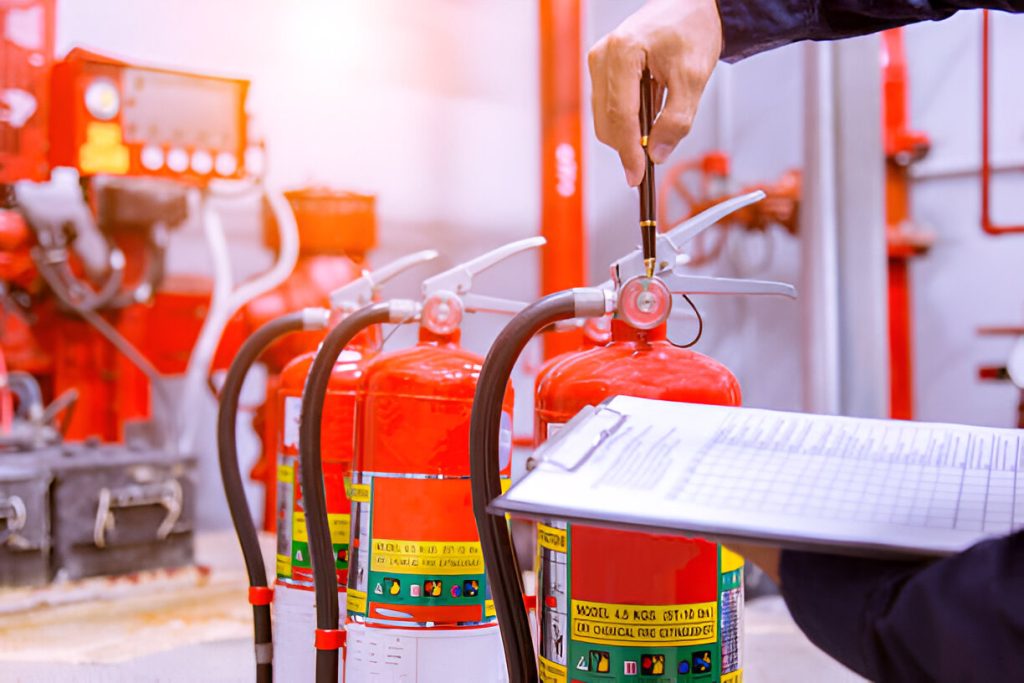In the United Kingdom, the question of whether a Fire Safety Certificate required for landlords is not straightforward and varies depending on the type of rental property and its location. While specific certificates per se may not always be mandated, the responsibility to conduct thorough fire risk assessments and ensure compliance with applicable fire safety standards is unequivocal under the law. This obligation primarily targets the safety mechanisms in communal areas of multi-occupancy buildings, but the nuances of these regulations can be complex. Understanding the breadth of these requirements is crucial for landlords to navigate the legal landscape effectively and avoid potential penalties. What, then, are the implications for landlords who may overlook these critical safety protocols?
Fire Safety Obligations for Landlords
Landlords in the UK bear significant responsibilities when it comes to fire safety in their rental properties. Governed by rigorous legislation, including the Regulatory Reform (Fire Safety) Order 2005, landlords must ensure their properties meet specific safety standards to protect tenants from fire hazards. This includes, but is not limited to, the proper installation and maintenance of smoke alarms and fire doors and ensuring that all escape routes are clear and accessible at all times.
Moreover, landlords are required to conduct regular fire risk assessments. These assessments are crucial as they identify potential fire hazards within the property, evaluate the risk of those hazards, and determine the adequacy of existing fire safety measures. Based on this assessment, landlords must take appropriate actions to reduce or eliminate the risk, which can include installing additional fire safety equipment or making structural amendments to enhance safety.
Compliance with these safety regulations is not merely a legal obligation but a critical component in safeguarding the lives of tenants. Landlords failing to comply with fire safety obligations can face severe penalties including fines and imprisonment.
Thus, understanding and implementing these fire safety requirements is paramount for landlords to ensure not only legal compliance but also the well-being of their tenants.
What Is a Fire Safety Certificate?
A Fire Safety Certificate is an essential document that certifies a property’s compliance with fire safety standards as required by relevant local and national regulations. This certification is a critical component in ensuring the safety of occupants in various types of buildings, particularly rental properties where the responsibility for ensuring fire safety often falls on the landlord.
The certificate itself is usually issued following a thorough assessment by a qualified fire safety inspector. This assessment includes checking the adequacy of fire detection and suppression systems, the integrity and suitability of fire escape routes, and the overall fire risk level of the property.

The certification process is designed to confirm that all fire safety measures are in place, functional, and adequate according to the current standards. Obtaining this certificate is not merely a bureaucratic step but a significant measure of precaution that underlines a landlord’s commitment to upholding safety standards.
It serves as proof that the property has been evaluated and meets the necessary criteria to protect its occupants from the risks of fire, thus playing a pivotal role in fire risk management and safety assurance.
UK Fire Safety Laws: What Landlords Need to Know
Understanding the intricacies of UK fire safety laws is imperative for landlords, as these regulations specify the requirements that must be met to ensure the safety of tenants in residential properties.
The Regulatory Reform (Fire Safety) Order 2005 is central to the UK fire safety legislation, applying to all non-domestic premises, including communal areas of residential buildings. Landlords must conduct a thorough fire risk assessment, which is pivotal in identifying potential fire hazards and determining the necessary prevention measures.
Additionally, the Housing Act 2004 introduced the Housing Health and Safety Rating System (HHSRS), which assesses risks in residential properties, including fire safety. Under this system, local authorities can enforce remedial action if properties are found not compliant with safety standards.
Landlords must also adhere to specific installation requirements for smoke alarms and carbon monoxide detectors as stipulated by the Smoke and Carbon Monoxide Alarm (England) Regulations 2015.
These laws are enforced rigorously, and non-compliance can lead to significant fines or even imprisonment. Landlords need to stay informed about these regulations and ensure their properties meet all legal safety standards to protect their tenants and avoid legal repercussions.
Mandatory Fire Safety Measures in Rental Properties
Ensuring compliance with mandatory fire safety measures is vital for landlords when managing rental properties.
These regulations are designed to protect both the physical property and the lives of tenants. Compliance is not only a legal requirement but a critical component in mitigating the risks associated with residential fires.
Key mandatory fire safety measures include:
Smoke Alarms Installation: Landlords must install smoke alarms on every storey of their rental properties used as living accommodations, and these must be in proper working order at the start of each new tenancy.
Carbon Monoxide Detectors: Properties with any kind of solid fuel-burning appliance, such as wood stoves or coal fires, are required to have carbon monoxide detectors in any room containing these appliances.
Fire Safety Furniture and Furnishings: All provided furniture must meet the fire resistance requirements set out in the Furniture and Furnishings (Fire Safety) Regulations 1988.
Fire Escape Routes: Landlords must ensure that there are adequate, clear fire escape routes in the property.
These routes must be kept clear at all times to allow for safe evacuation in case of a fire.
Adhering to these measures not only ensures legal compliance but also significantly enhances tenant safety.
Do All Landlords Need a Fire Safety Certificate?
Navigating the requirements for fire safety compliance, landlords often question whether a specific fire safety certificate is universally mandatory across the UK. The straightforward answer is that there is no singular, overarching fire safety certificate required for all rental properties.
However, the obligations vary based on the type of property and the specific regulations that apply to different regions and property categories within the UK.
The regulatory framework, primarily derived from the Regulatory Reform (Fire Safety) Order 2005 in England and Wales, mandates that landlords conduct a fire risk assessment in all common areas of rental properties.
Although this assessment itself is mandatory, it does not culminate in the issuance of a formal “fire safety certificate.” Instead, landlords must identify potential fire hazards and implement adequate measures to mitigate these risks, ensuring the safety of their tenants.
Furthermore, compliance with these regulations must be documented and reviewed regularly, with adjustments made as necessary. This documentation serves as proof of compliance rather than a formal certificate.
Landlords must understand that their responsibility is not merely to obtain a document but to actively maintain ongoing fire safety standards in their properties.
Fire Safety Requirements in HMOs vs. Standard Rentals
While general fire safety regulations apply universally, specific requirements for Houses in Multiple Occupation (HMOs) are more stringent compared to standard rental accommodations.
The complexity and higher risks associated with multiple occupants necessitate a robust approach to fire safety management. These regulations ensure that the increased potential hazards due to higher occupancy rates are effectively mitigated.
Here is a detailed comparison highlighting key differences:
1. Fire Detection and Alarm Systems: HMOs require a comprehensive fire alarm system that must be interconnected and cover all parts of the building. Standard rentals may only need smoke alarms on each floor.
2. Fire Doors: In HMOs, fire-resistant doors are mandatory in certain areas to prevent the spread of fire and smoke. Standard rentals typically do not require fire doors unless specified by a risk assessment.
3. Emergency Escape Routes: HMOs must have clearly marked and unobstructed escape routes at all times. The specification for these routes is usually more rigorous than in standard rental properties.
4. Safety Checks and Maintenance: Landlords of HMOs are required to perform more frequent and detailed safety checks and maintain records of these checks. In contrast, standard rentals have relatively less stringent requirements for documentation and frequency of checks.
Penalties for Non-Compliance with Fire Safety Regulations
Failure to comply with fire safety regulations can result in significant penalties for landlords, ranging from hefty fines to imprisonment. The severity of these penalties reflects the critical nature of maintaining safety standards to protect tenants from potential fire hazards. Enforcement of these regulations is stringent, underscoring the importance of compliance.
|
Violation Type |
Possible Fine |
Imprisonment Possibility | |
|---|---|---|---|
|
Minor non-compliance |
Up to £5,000 per offense |
None | |
|
Major non-compliance |
Unlimited fines depending on the court’s decision |
Possible | |
|
Repeated violations |
Escalating fines; potential for cumulative fines |
Likely | |
Landlords found in violation of fire safety obligations might face further consequences, including suspension of rental licenses or orders to cease rental operations until compliance is achieved. These penalties are not only financial but can also include criminal charges, particularly in cases where negligence leads to serious injury or death. The legal framework is designed to incentivize landlords to prioritize safety and adhere strictly to fire safety regulations, thereby safeguarding the well-being of tenants and property.
Get a Fire Safety Certificate in London
Given the severe penalties associated with non-compliance, landlords must ensure they obtain a fire safety certificate, particularly in London, where regulations are rigorously enforced. The process, while stringent, is integral in ensuring the safety of occupancies and alignment with local governance.

To successfully navigate the acquisition of a fire safety certificate in London, landlords should adhere to the following steps:
1. Assessment Request: Contact a certified fire safety assessor. The London Fire Brigade offers a list of accredited professionals who can perform the necessary evaluations.
2. Property Inspection: Schedule a thorough inspection of the property. This includes all common areas, emergency exits, and fire safety systems like alarms and extinguishers.
3. Mitigation of Risks: Implement any required modifications or improvements suggested in the inspection report. This may involve installing fire doors, upgrading alarm systems, or improving emergency signage.
4. Certification Issuance: Once compliance is confirmed by the assessor, a fire safety certificate will be issued. This certificate should be prominently displayed and readily accessible for review during any inspections.
Landlords must keep abreast of their obligations under the Regulatory Reform (Fire Safety) Order 2005, ensuring continual compliance and periodically reviewing safety measures in alignment with any changes in legislation or property structure.
Conclusion
In conclusion, while a universal fire safety certificate is not mandated for UK landlords, compliance with fire safety regulations remains crucial. Landlords must conduct thorough fire risk assessments, especially in common areas, to meet legal requirements and ensure tenant safety. Documentation of these assessments is essential. Failure to adhere to these standards can result in significant penalties, underlining the importance of vigilance and proactive management in fire safety practices across rental properties.










